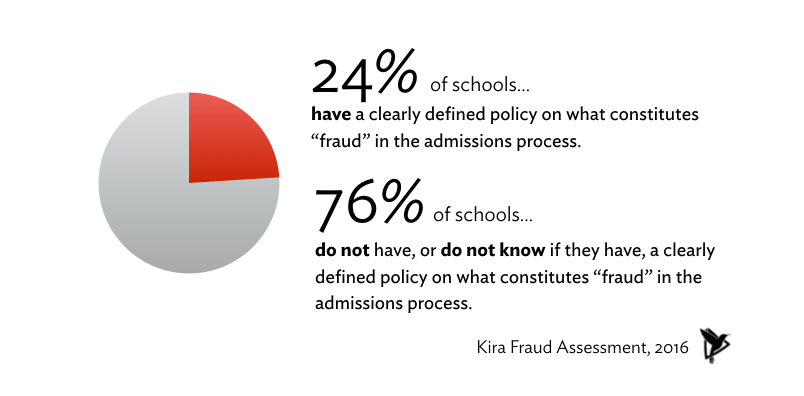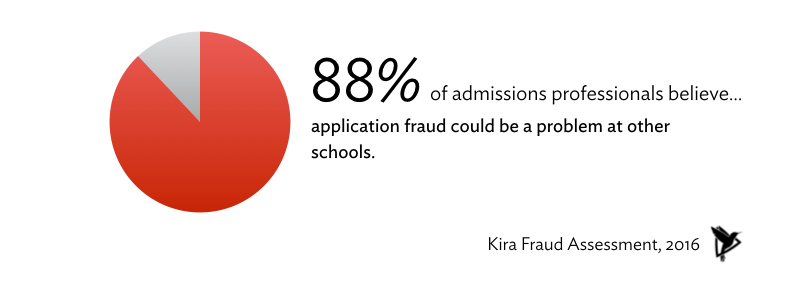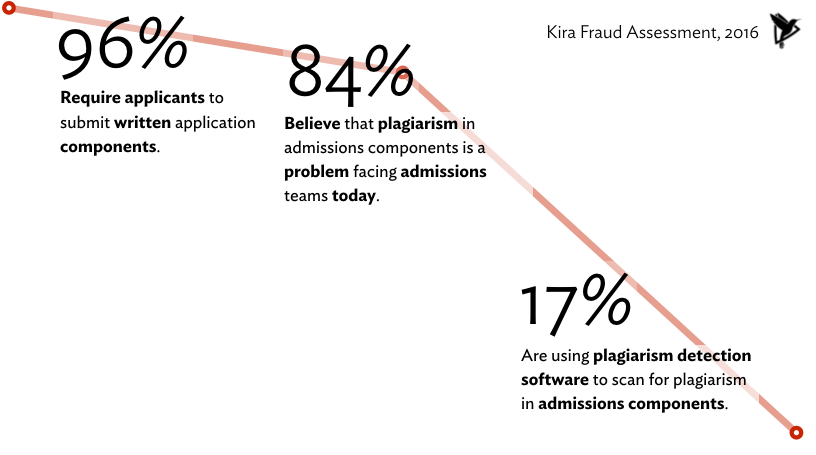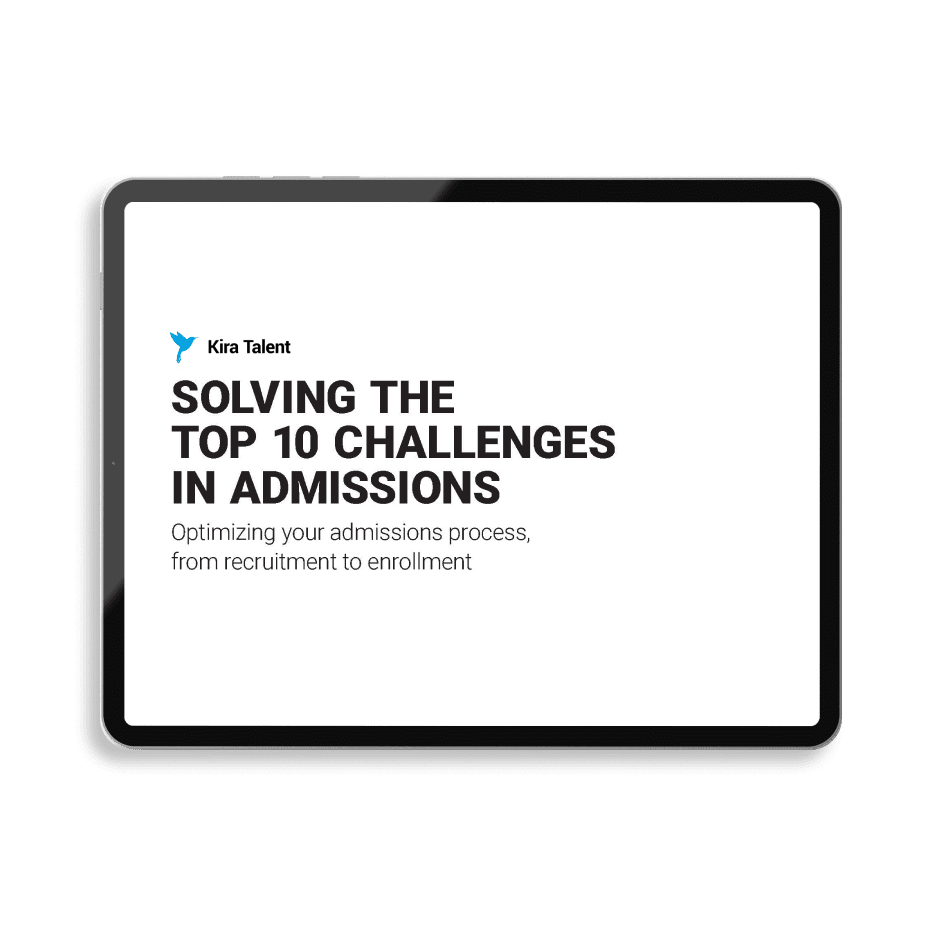The team at Kira has been passionate about helping schools prevent admissions fraud since we began working with colleges and universities four years ago. And to solve a problem, you need to really understand it.
So, we’ve conducted the biggest research initiative in history on the topic: We’ve spoken at length with admissions directors about how fraud manifests itself in the admissions process. We’ve talked to honest applicants about how fraud affects them, and what motivates their peers to cheat. We’ve even gone undercover and hired a consulting service to plagiarize an MBA essay.
More recently, we asked fifty business schools to share intimate details about their admissions process to understand, on average, how prepared schools are to prevent and detect application fraud.
Here’s what we found:
Admissions teams do not have a consistent definition of ‘application fraud’
Only one in four schools have a clearly defined policy on what constitutes "fraud" in admissions. Despite the academic programs themselves having stark restrictions on academic dishonesty, this concern for cheating has not trickled into the majority of schools’ application processes.

84 percent of admissions professionals agree that plagiarism in admissions application components, like essays, personal statements, or resumes is a problem facing admissions teams today. And 62 percent agree that admissions consultants may help applicants fabricate information on their applications.
Schools are not prepared to deal with admissions fraud
Only 30 percent of the schools we surveyed had a process in place to prevent and detect admissions fraud. Of those who did not have a process, just one in five schools have plans to implement a fraud prevention plan in the future.
Why?
“Well, it will never happen to me.”
88 percent of admissions professionals said they believe that application fraud could be a problem at other schools, yet only half believe that it could happen at their school.

Because many admissions teams are in denial that their school could face application fraud, combined with a level of comfort in the status quo, admissions teams are remaining complacent with their current processes and regulations.
If you don’t look for fraud, you can’t find it, which leaves schools to ask: “Why implement an anti-fraud process when fraud doesn’t affect my school?”
Smeal College of Business realized they had a fraud problem in 2010 when they discovered 29 applications contained passages from this same article. They also found a correlation between top GMAT scores and incidents of plagiarism.
There is a misconception among schools that only ‘poor performing’ students cheat. As many schools race to the top to enroll the best applicants, they miss the ‘diamonds in the rough’ that look less stellar on paper. Students who are the ultimate application strategists may be test-writing all stars, but that does not mean they won’t pay their way through the rest of your admissions process.
Poets & Quants estimates that as many as 80 percent of the international applicants and 30 to 50 percent of domestic applicants to the top U.S. schools are using admission consultants. I also learned in the process of hiring an MBA essay writing service that the typical clientele for essay writing services tends to be students applying to top schools, because of the intense level of competition.
The degree to which these consultants are ‘helping’ applicants varies greatly, blurring the line between consultants’ work and students’ aptitude.
Why schools need to start caring about admissions fraud
Admissions fraud deteriorates the caliber of your classroom, the success of your students, and the quality of your alumni network. Accepting students who do not have the competence, capabilities, or communication skills to succeed your program hurts them as much as it hurts you, both short and long-term.
Admissions teams are responsible for bringing in classroom-ready students for faculty members to educate and inspire. However, if students who do not actually meet the criteria are admitted, group work becomes more challenging and the integrity of your classroom could be compromised by students who continue to cheat.
Additionally, as your grads move into the real world, employability rates, salary increases, and graduate satisfaction will suffer if students become graduates without the proper skills to land and keep good jobs at the end of their degree.
Where admissions fraud occurs in a typical process
After gathering an understanding of how admissions professionals feel about fraud, we walked through a series of questions about their review process to understand where fraud could occur.
These are the four main areas where schools fail to prevent and detect fraud:
Schools need to educate applicants about application fraud and its consequences
One question we asked was: “Does your school offer educational content, like webinars or blog posts, on plagiarism, fair use, and intellectual property for potential applicants wishing to learn more about the topic?”
Only 12 percent of schools do.
Creating educational content is a one time project that can educate and inform applicants every admissions season going forward. In our applicant research so far, we’re finding “lack of education” to be the most common reason applicants commit fraud.
Even if applicants know they’re cheating, they are likely uncertain about the consequences. Just 10 percent of schools ask their applicants to read and accept an agreement not to commit plagiarism and fraud before starting their application.
With a disclaimer out front, it forces applicants to stop, step back, and say, “hold on, I might get caught for this.” For applicants who are found committing fraud, it’s also an easy point for admissions directors to reference back to when choosing a method of discipline.
Plagiarism detection software is not being used at the admissions stage
Plagiarism detection is extremely common in higher education, however, it is far less common at the admissions stage.

Of the schools we surveyed, 96 percent require applicants to submit written application components but only 17 percent are running applications through plagiarism detection software. Many programs will check students’ reports, essays, and presentations for plagiarism through software like Turnitin throughout students’ academic careers, but fail to do this prior to admitting applicants into their program.
Plagiarism can be a silent game changer in an application because a strongly written submission can really inspire and elevate an applicant in the minds of reviewers. If you don’t catch plagiarism prior to an applicant interview, and the written application was strong, you risk a form of bias called the “halo effect” where you go into the interview with a strong opinion of the applicant based on one piece of evidence.
The latter effects can be serious, as admitted students who “got away with plagiarism” will be far more likely to plagiarize in their program. This not only creates additional work for your faculty and program administrators, but it could result in these students being removed from your program -- diluting your graduation rates and hurting your school’s reputation and income.
Admissions reviewers must verify applicant identity during interviews
92 percent of participating schools use interviews in their admissions process, which is an excellent way for admissions teams to verify the communication skills of their applicants.
However, only one in four schools are consistently verifying the identity of their applicants during interview. Although it may not seem like a threat, there are consulting services and agencies that either coach applicants on interview questions, or offer to sit in and conduct the interview for the applicant. If you’ve never met the applicant, how would you know the difference?
One solution to this, for schools conducting video interviews, is to make the first question in every interview an opportunity for applicants to show a piece of ID to the camera.
Admissions teams can improve how they track and record incidents of fraud
Fewer than 20 percent of schools have any kind of obvious tracking in place to record incidents of fraud, suggesting the remainder of schools are dealing with applicants individually and stressing about how to handle fraud on a case-by-case basis.
![]()
Maintaining a record of fraud, both what the act of ‘fraud’ consisted of, and how it was dealt with, is critical in understanding when and how it occurs in your specific process as well as to provide reviewers and new hires with use cases for future admissions seasons. While an admissions team may understand the definition of ‘plagiarism’, an example of how it manifests itself will help reviewers know what to expect and detect.
About the study:
This study was conducted by the team at Kira Talent in Spring 2016. Data was collected in the form of an assessment sent to a variety of anonymous academic admissions contacts. Participants were given a list of multiple-choice questions regarding their stance on admissions fraud, as well as a series of questions about their existing process. It was completed by fifty participants in unique locations, 19 of which identified themselves as current Kira users.



